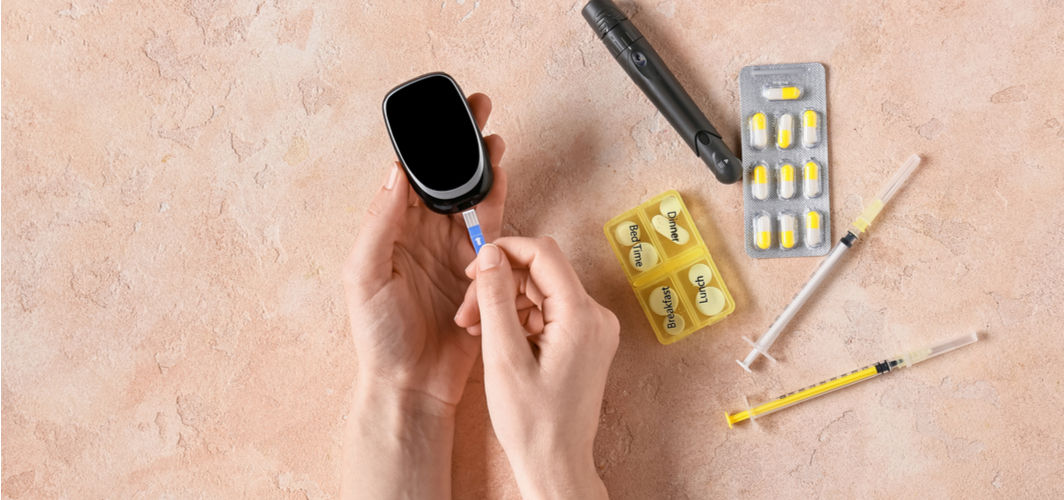Diabetes Management
What Happens if a Diabetic Gets Stung by a Bee?
2 min read
By Apollo 24|7, Published on - 19 June 2024
Share this article
0
0 like
.jpg?tr=q-80)
Insects such as bees pose unique challenges for individuals with diabetes. A bee sting, a minor inconvenience for most, can potentially present significant health complications for someone with diabetes. But why is this the case and how can one manage it effectively?
Symptoms and Complications
Bee venom contains several substances that can cause varying degrees of reactions in different individuals.
Symptoms:
- Pain
- Redness
- Swelling in the area of the sting
- Difficulty breathing (in case of allergic reaction)
- Rapid heart rate (in case of allergic reaction)
- Low blood pressure (in case of allergic reaction)
Complications:
- An allergic reaction can complicate diabetes management by causing stress-induced blood sugar spikes.
- Difficulty breathing and rapid heart rate can exacerbate existing cardiovascular issues common in diabetics.
- Low blood pressure can be particularly dangerous for diabetics, leading to dizziness and potential fainting.
- Localized pain and swelling may affect the ability to manage daily activities, including blood sugar monitoring and medication administration.
Diabetes and Bee Stings
Diabetes often impairs the body’s ability to heal wounds owing to high blood glucose levels. These elevated levels can decline the healing process and increase the risk of infection. Therefore, a bee sting, which would normally heal within a week in healthy individuals, may take longer in individuals with diabetes.
Avoiding Bee Stings and Effective Management
Prevention is always better than cure. Here are some simple tips to avoid being stung:
- Avoid wearing bright colours or floral prints that can attract bees.
- Don't walk barefoot outdoors.
- Always keep food containers closed when enjoying a meal outside.
However, if you are stung by a bee, you can follow this approach:
- Immediately remove the stinger to minimise venom exposure.
- Clean the area with soap and water.
- Apply a cold pack to decrease swelling.
- Immediately consult your doctor if there is no improvement or the symptoms worsen.
Managing diabetes is an ongoing process requiring vigilance and proactive intervention. The Apollo Super 6 programme provides comprehensive support to help you manage your condition better through dietary changes and increased activity. It offers the tools and guidance needed to navigate this journey more comfortably.
A bee sting may be a daunting experience for someone with diabetes; however, it can be effectively managed with vigilance and proper care. Remember, prompt medical intervention is crucial for managing such situations.
Diabetes Management
Consult Top Diabetologists
View AllLeave Comment
Recommended for you

Diabetes Management
Practical Measures for Diabetes Management and Healthy Living
Diabetes management involves a combination of healthy eating, regular physical activity, stress management, and consistent monitoring of blood sugar levels. Adopting these practical tips can significantly improve your health and make living with diabetes more manageable.

Diabetes Management
How Does Vitamin D Benefit People with Diabetes?
Vitamin D offers several health benefits for individuals with diabetes. It plays a crucial role in improving insulin sensitivity, which further helps in regulating blood sugar levels more effectively. Adequate vitamin D levels in your body may also reduce the risk of developing type 2 diabetes. Vitamin D's role in regulating calcium absorption is crucial for insulin and glucose uptake.

Diabetes Management
9 Diet Tips for New Mothers With Diabetes: Foods to Adopt and Adapt
New mothers with diabetes face unique postpartum nutrition challenges. To manage blood sugar levels and support recovery, follow key dietary tips: choose complex carbs, lean proteins, and healthy fats; prioritize fiber-rich foods; consume fruits moderately; include dairy or alternatives; stay hydrated; eat small, frequent meals; seek advice from dietitians for personalized plans. Customizing nutrition is vital for a healthy postpartum experience.
Subscribe
Sign up for our free Health Library Daily Newsletter
Get doctor-approved health tips, news, and more.
Visual Stories

8 Fruits That are Incredibly Healthy for Diabetes
Tap to continue exploring
Recommended for you

Diabetes Management
Practical Measures for Diabetes Management and Healthy Living
Diabetes management involves a combination of healthy eating, regular physical activity, stress management, and consistent monitoring of blood sugar levels. Adopting these practical tips can significantly improve your health and make living with diabetes more manageable.

Diabetes Management
How Does Vitamin D Benefit People with Diabetes?
Vitamin D offers several health benefits for individuals with diabetes. It plays a crucial role in improving insulin sensitivity, which further helps in regulating blood sugar levels more effectively. Adequate vitamin D levels in your body may also reduce the risk of developing type 2 diabetes. Vitamin D's role in regulating calcium absorption is crucial for insulin and glucose uptake.

Diabetes Management
9 Diet Tips for New Mothers With Diabetes: Foods to Adopt and Adapt
New mothers with diabetes face unique postpartum nutrition challenges. To manage blood sugar levels and support recovery, follow key dietary tips: choose complex carbs, lean proteins, and healthy fats; prioritize fiber-rich foods; consume fruits moderately; include dairy or alternatives; stay hydrated; eat small, frequent meals; seek advice from dietitians for personalized plans. Customizing nutrition is vital for a healthy postpartum experience.

